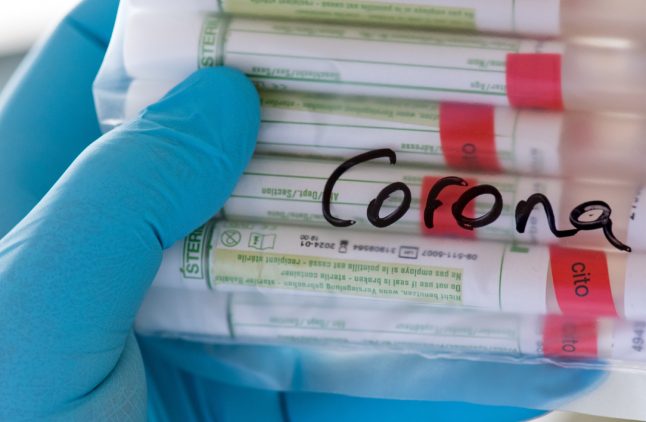According to experts in Germany, individuals who have survived an infection with COVID-19, or Sars-CoV-2, are probably “initially immune” to the pathogen.
As of Monday morning, Germany had over 100,000 confirmed coronavirus cases and over 1,500 deaths, according to data from Johns Hopkins University.
READ ALSO: Germany plans mass study to track immunity to coronavirus
We already know that individuals develop antibodies after being infected with the novel coronavirus, explained virologists Melanie Brinkmann, from the Helmholtz Center for Infection Research in Braunschweig, and Friedemann Weber from the Institute for Virology at the University of Gießen.
Based on what we know from similar viruses, the body responds to infection by building antibodies to prevent reinfection, they said.
Testing for the antibodies
According to Berlin virologist Christian Drosten, it takes about 10 days for antibodies to form after a person is infected with the novel coronavirus.
A blood test can then determine whether or not a patient has developed antibodies, “regardless of whether they had a severe, mild, or completely unnoticed infection,” Drosten said in an NDR podcast last week.
Even those who have had a completely unnoticed infection will test positive for the antibody.
Knowledge of a past infection is also important to give people with existing immune protection the “green light” to return to work and ease social distancing.
Germany is currently considering so-called “immunity passports” which would allow people to return to a normal life sooner – or even volunteer to help coronavirus patients due to the lower risk that they face.
How long does immunity last?
 A researcher in Braunschweig is exploring antibody development with the novel coronavirus. Photo: DPA.
A researcher in Braunschweig is exploring antibody development with the novel coronavirus. Photo: DPA.
Experience with other coronaviruses in humans suggests that the immune protection will last for one to two years after infection.
“In all likelihood, someone who has been infected with the Sars-CoV-2-Virus is protected from renewed infection for at least a few years,” said Thomas Kamradt, President of the German Society for Immunology.
Still, it is not possible to know this for certain, since the antibody tests are just now coming out and long term studies are not possible given that the virus has only been known for a few months.
The amount of time that a person would have protection from reinfection depends on the rate at which the concentration of the antibodies in the blood, known as the antibody titer, decreases. The higher the concentration, or titer, the higher the number of antibodies, and thus the stronger the protection from renewed infection.
READ ALSO: How German scientists hope to find answers in country's worst-hit spot
According to Kamradt, it would be “extremely unusual” if the antibodies produced against the novel coronavirus did not protect from renewed infection.
However, Matthais Orth, Medical Director at the Institute for Laboratory Medicine at the Marienhospital Stuttgart, noted that it is not yet possible to say for certain whether or not the antibodies will protect against reinfection.
There is also uncertainty about what concentration of antibodies is necessary to protect against renewed infection.
Different disease courses
According to Brinkmann and Weber, it will also be interesting to study the antibody titers of people with different experiences with the disease.
This will also clarify the question of whether individuals with particularly difficult courses with the virus have formed antibodies at all or, as they put it: “Was the course so difficult precisely because there were no antibodies formed yet?”
They hope that further research will also answer the question of when specific antibodies are formed in the course of the infection.
Giving the “green light”
Brinkmann and Weber also believe it is very important to identify reliable antibody tests and use them across a wide area. It is essential to identify the undisclosed number of unrecorded cases.
That would help to recognize how many individuals have already had the infection unnoticed, and therefore how high the basic immunity of the population is already.
According to statistical projections, around 60 to 70 percent of the population must be infected before the pandemic wave comes to a standstill on its own – without protective vaccination.



 Please whitelist us to continue reading.
Please whitelist us to continue reading.
This is really good to know